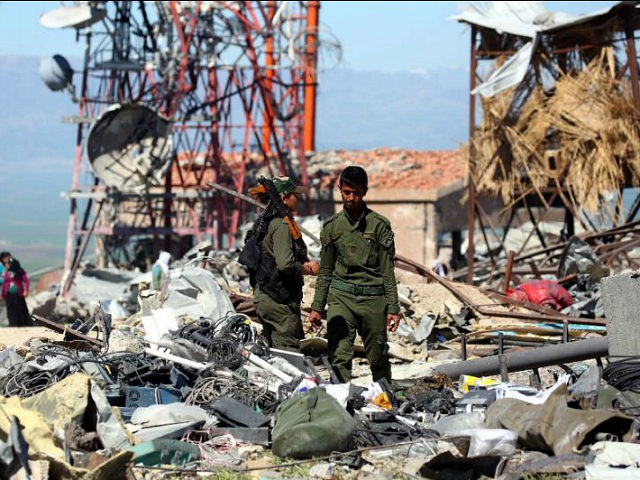Early Tuesday morning, a wave of Turkish airstrikes reportedly struck a headquarters building used by the Kurdish YPG militia in northeastern Syria. The London-based Syrian Observatory for Human Rights said at least 18 YPG fighters and media officials were killed in the attack.
Turkey also conducted airstrikes in the Sinjar region of Iraq, ostensibly aimed at the militant Kurdish separatists of the PKK. However, Kurdish Peshmerga forces in Iraq – another key U.S. military ally against the Islamic State – also said the Turks hit their positions, killing five of their troops.
The YPG released a statement saying its headquarters in Mount Karachok near the Syria-Turkey border was hit by Turkish planes, damaging a media center, radio broadcast facilities, and military installations.
The YPG described Turkey’s attack as “treacherous” and “barbaric” and even accused the Turks of attempting to undermine the planned offensive against Raqqa, the Syrian capital of the Islamic State. Critics of Turkey have accused it of tacitly supporting ISIS against the regime of Bashar Assad in Syria and of covertly profiting from trade with the Islamic State.
Syrian Kurdish leader Salih Muslim asked the United States to defend them against further Turkish strikes. “A people that is fighting terrorism is being stabbed in the back. Coalition forces must not remain silent against this. No one should accept these attacks,” Muslim said.
The Turkish military said these airstrikes were intended to stop the PKK from smuggling weapons into Turkey. A statement from the military described the targets as “terrorists” and “terror hubs.” According to the Turkish military, 70 militants were killed in the airstrikes.
The PKK recently claimed responsibility for a bomb attack on a police compound in southeastern Turkey that killed three people. The attackers dug a tunnel beneath the compound to plant what they described as “more than 2.5 tonnes of explosives.”
Turkey accuses other Kurdish forces, particularly the YPG in Syria, of being in league with the PKK. The PKK does have a presence in the Sinjar region, in part because it came to the aid of the Yazidi minority when ISIS tried to exterminate them. The PKK has been training and arming Yazidis to fight the Islamic State and has said it will not withdraw from Sinjar until Yazidi forces control the area.
The Kurdish administration has been urging Yazidis to join the Peshmerga and other militia units instead of the PKK. Peshmerga commanders have asked the PKK to withdraw from the area.
This is a difficult conflict for the United States to negotiate. On the one hand, Turkey is a NATO member and an important regional ally the U.S. is nervous about alienating. The U.S. classifies the PKK as a terrorist organization, just as Turkey does. On the other hand, the Peshmerga and YPG are crucial American battlefield allies against the Islamic State. The Peshmerga and YPG have also clashed among themselves, even while both cooperate with the United States.
American military officials reportedly visited the Mount Karachok region by helicopter on Tuesday to assess the damage from Turkey’s airstrikes. Turkey’s Daily Sabah, which has a pro-government bent, began its report on the visit by matter-of-factly stating the YPG is an “offshoot” of the PKK terrorist group and said banners depicting jailed PKK leader Abdullah Ocalan can be seen in the background of photos that showed U.S. officials walking with YPG representatives.
The U.S.-led coalition in Iraq and Syria issued a statement encouraging all forces in the region to “concentrate their efforts on ISIS and not toward objectives that may cause the Coalition to divert energy and resources away from the defeat of ISIS in Iraq and Syria.”
The Iraqi Foreign Ministry denounced Turkey’s strikes as a violation of its sovereignty, warned that a larger Turkish cross-border military incursion would “destabilize northern Iraq,” and asked the international community to block further “interference” by Turkey.

COMMENTS
Please let us know if you're having issues with commenting.